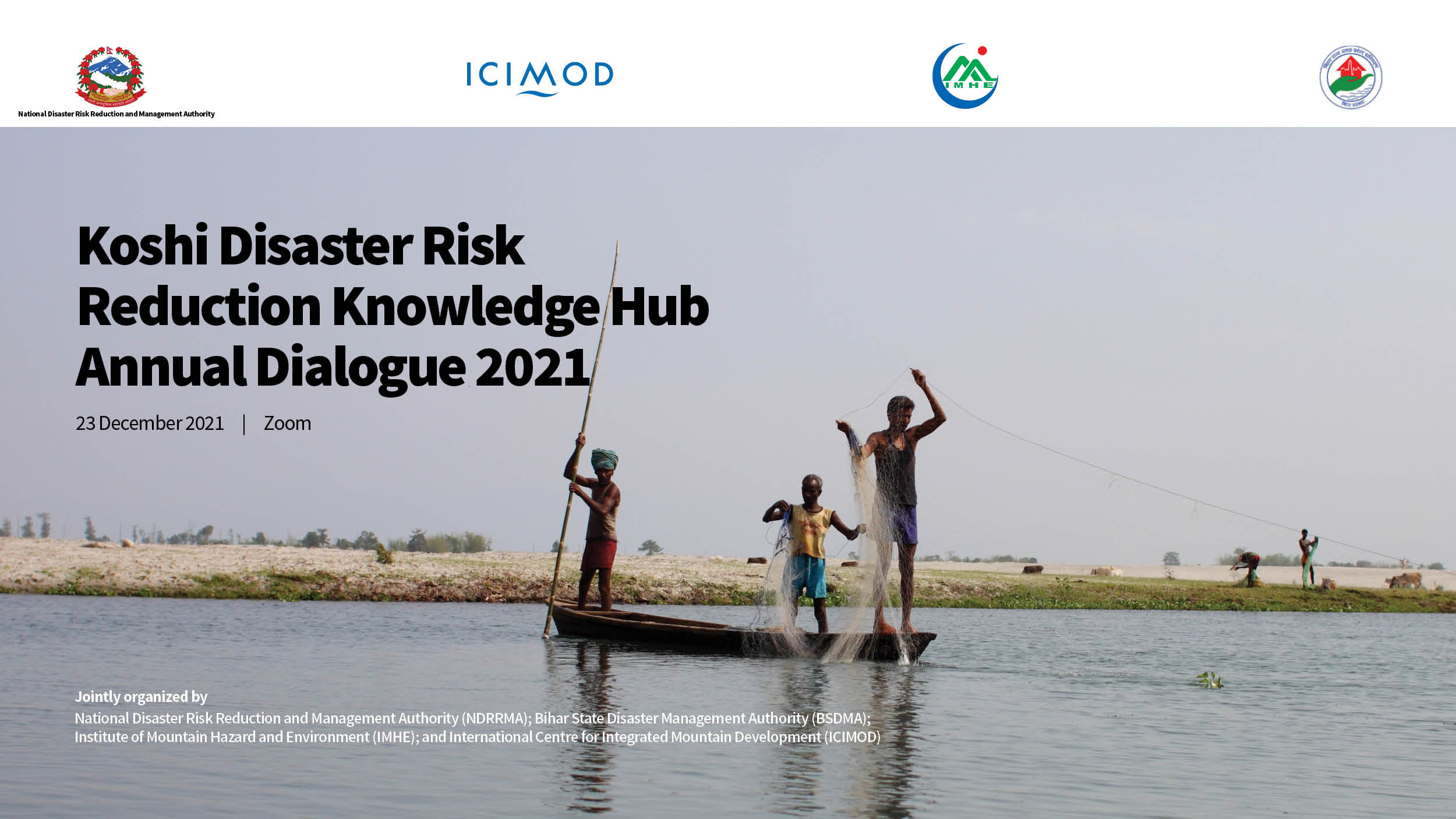This site uses cookies, as explained in our terms of use. If you consent, please close this message and continue to use this site.

The Koshi Disaster Risk Reduction Knowledge Hub (KDKH) Annual Dialogue brought together more than 70 researchers, policymakers, and members to discuss disaster risk reduction in the Koshi Basin and explore ways of transboundary collaboration between basin countries and like-minded institutions. The dialogue, held on 23 December 2021, was organized in collaboration with Nepal’s National Disaster Risk Reduction and Management Authority (NDRRMA); Bihar State Disaster Management Authority, India (BSDMA); Institute of Mountain Hazards and Environment (IMHE), China; and the Chinese Academy of Sciences (CAS).
KDKH is a platform led and driven by its members to foster transboundary collaboration on disaster risk reduction and strengthen science, policy, and practice interlinkages. Since its inception in December 2018, KDKH members have convened every year for the dialogue.
Considering that floods, glacial lake outburst floods (GLOFs), and landslides are recurring risks in the Koshi Basin, members discussed potential disaster management strategies. Experts stressed the importance of developing deeper knowledge on the causes and triggers of the disasters and effective mechanisms for preparedness and adaptation. H.E. Felicity Volk, Australian Ambassador to Nepal, stressed that such mechanisms must be inclusive of and engage with marginalized communities as “it is those who are the most marginalized that are the most heavily impacted by disasters”.
One of the sessions in the dialogue specifically focused on discussing the standard criteria for identifying and prioritizing Potentially Dangerous Glacial Lakes (PDGLs). Building on our work on developing the standard criteria, experts explored how we could incorporate socio-economic, infrastructural, and ecological components for GLOF risk assessment and glacial lake hazard assessments.
The panel discussion on managing transboundary risks in a multi-hazard environment delved into key issues that directly impacted the basin. Key issues include the translation of science into policy and practice, comprehensive and multi-perspective media coverage on transboundary disasters, disaster resilience infrastructure, and collaboration of different stakeholders such as government, non-government, and donor agencies on joint efforts for DRR. The panelists emphasized that technology, including Artificial Intelligence (AI), could be leveraged strongly for transboundary risk management activities such as assessment, evaluation, and forecasting measures. Furthermore, multi-level communication between communities and journalists, journalists across the basin countries, and among scientists and journalists, is crucial for the knowledge on transboundary risk to be understandable and to put into practice.
Members also discussed the importance of integrating Gender and Social Inclusion (GESI) in conversations and decisions related to climate change and DRR. Sama Shrestha, Programme Specialist – Peace, Security, Human Action and DRR, UN Women, stated that the differential impacts of disasters on women, girls, and vulnerable groups is poorly understood, and that it is crucial to consider these specific contexts and vulnerabilities in disaster preparedness and response. Wang Liyan, Senior Climate Change and Environment Advisor, Swiss Agency for Development and Cooperation, emphasized that a resilience-based approach should be key in both short-term disaster response measures and long-term rebuilding such as relocating communities and reconstructing hydropower infrastructure.
The dialogue also highlighted the importance of knowledge hubs like the KDKH in consolidating knowledge and best practices on disaster risk reduction. Members, including government agencies such as NDRRMA and BSDMA, shared their willingness to lead the Nepal and India KDKH country chapters. Furthermore, they expressed solidarity in actively supporting knowledge exchange and facilitation through the Hub.
Stay up to date on what’s happening around the HKH with our most recent publications and find out how you can help by subscribing to our mailing list.
Sign Up